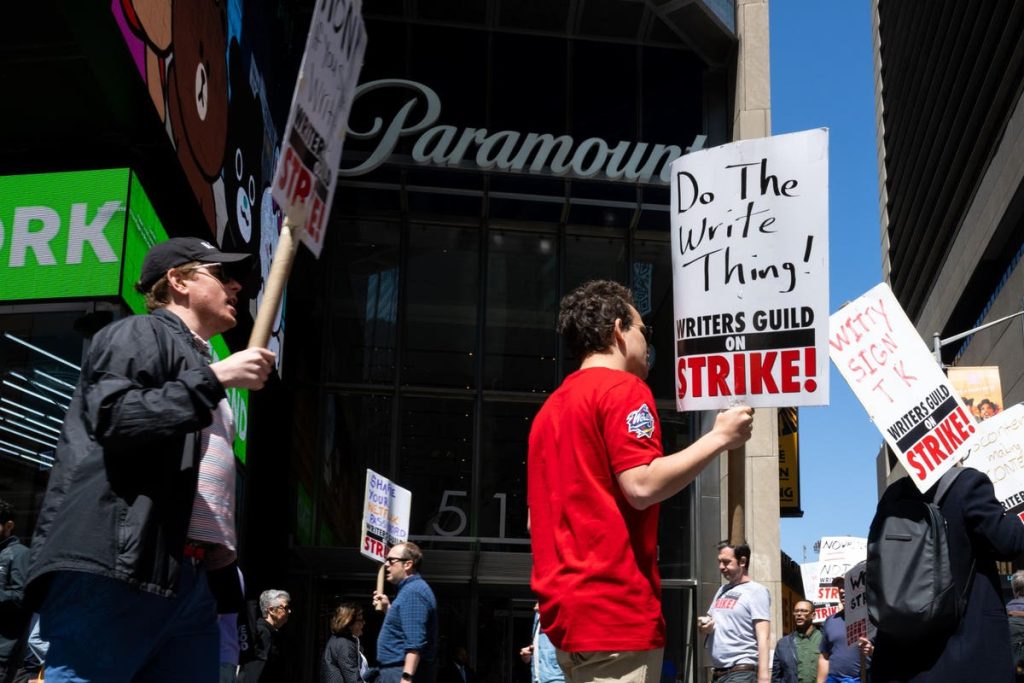In the beginning of May, unions representing dramatic writers in film and television initiated the first writer’s strike since the landmark Writer’s Guild of America strike in 2007. As the profession navigates advances in the use of artificial intelligence and changes in royalty structures as a result of streaming services, unions argue that writers’ pay fails to adequately compensate emerging demands. In their strike announcement, the Writer’s Guild of America claimed that studios are “devaluing the profession of writing,” further arguing that “they have closed the door on their labor force and opened the door to writing as an entirely freelance profession.”
While the strike has the potential to upend the entertainment industry and pose economic ramifications for regions that rely on the film industry, it can also provide critical insights for aspiring film students and dramatic writers about the future of the profession and their place within it.
As the strike continues to unfold, here are three key takeaways for students interested in pursuing further study in film and television:
1. Creativity deserves fair compensation—but it often comes with a fight.
One of the central issues raised by the writers’ strike is fair compensation for creative work. The strike serves as a reminder to prospective students that their creative endeavors have value and should be appropriately compensated. At the same time, it should provide students with an awareness of the challenges that many in the profession face when seeking fair wages for their work. Choosing a career in film and television (as in other creative endeavors) may realistically require them to advocate for the monetary value of their work. Understanding the business side of the entertainment industry and the complexities of contracts, residuals, and intellectual property rights is essential for students who are considering a career in the field.
Aspiring filmmakers and dramatic writers should develop a strong understanding of industry standards, learn how to negotiate for fair compensation, and be proactive in protecting their intellectual property. By learning about copyright laws, licensing agreements, and royalty structures, students can ensure that their creative contributions are appropriately acknowledged and rewarded. One of the best ways that students can ensure that they will acquire this knowledge is by thoroughly researching colleges and universities on their lists to ensure that their curriculum incorporates such instruction. Prospective students can ask admissions officers, alumni in their area, or current students about how the program prepared them to advocate for their work in the industry.
2. Advocacy and solidarity can affect meaningful change.
The writers’ strike underscores the power of solidarity and collective action in demanding fair treatment and equitable working conditions. Aspiring filmmakers and dramatic writers should recognize the potential of joining forces with their colleagues to protect their rights and advocate for better treatment within the industry. By understanding the victories that resulted from prior writer’s strikes and the overwhelming change they ushered in, high school students can learn the importance of standing with their peers to create more equitable working conditions.
Prospective students can also gain an appreciation for the vital role that writers play in the storytelling process. Writers—whether for film, television, or stage—are the architects of narratives, bringing characters, emotions, and ideas to life. Recognizing the importance of their role will empower future writers to value their creative contributions and advocate for recognition for their work.
3. New technology is rapidly changing storytelling on the screen.
Finally, the shifting technological landscape has the potential to impact a multitude of professions—and film and television writing is no exception. The WGA has made AI programs such as ChatGPT a cornerstone of their negotiations, demanding that studios limit its use to preserve the craft of writing. The negotiations highlight the need for creative professionals to adapt to changing platforms and distribution models. Aspiring filmmakers and dramatic writers must be aware of the impact of digital platforms, streaming services, and emerging technologies on the industry. Acquiring such knowledge will allow students to explore new avenues for storytelling and collaborate with creators in different mediums.
Prospective students should not only understand the current debates about the ways in which technology is altering the profession, but they should explore opportunities to combine their storytelling skills with emerging technologies such as virtual reality, augmented reality, or interactive media. By staying informed and adaptable, students can position themselves as versatile and innovative storytellers and prepare to navigate the future of the industry.
As the entertainment industry continues to evolve, aspiring film and writing students must be proactive and take note of the ways that labor activism, new technologies, and the rise of streaming services may shape their career in film. The ongoing writers’ strike has the potential to change the field and empower future creatives to contribute to a more equitable industry and better understand their value as storytellers for audiences of the digital age.
Read the full article here










